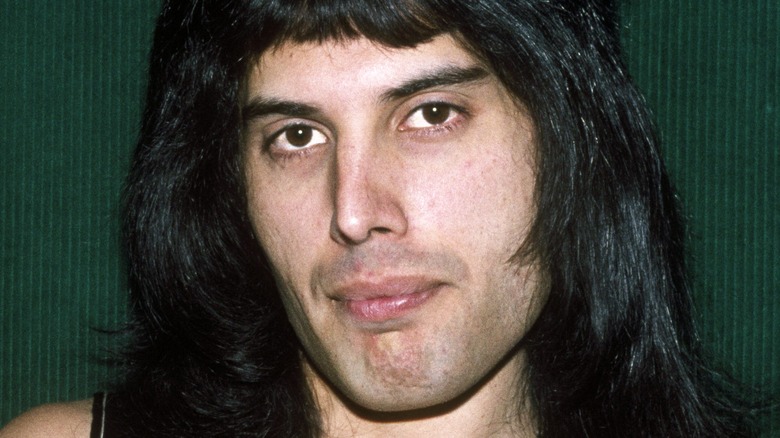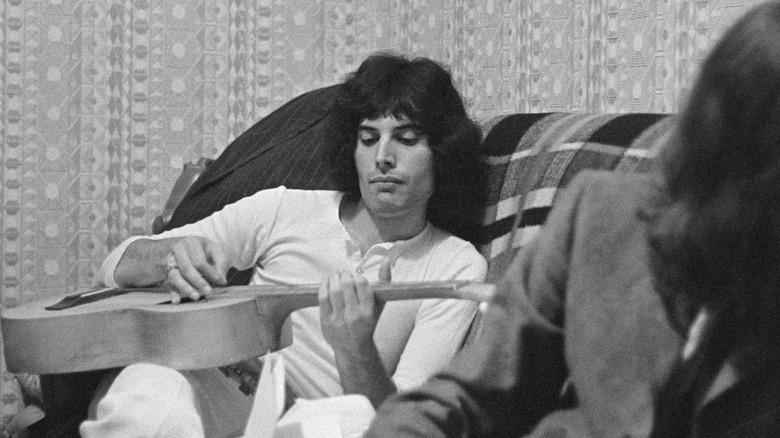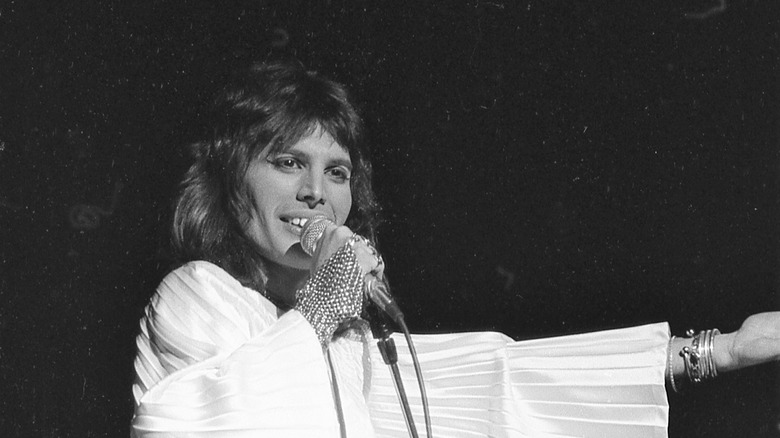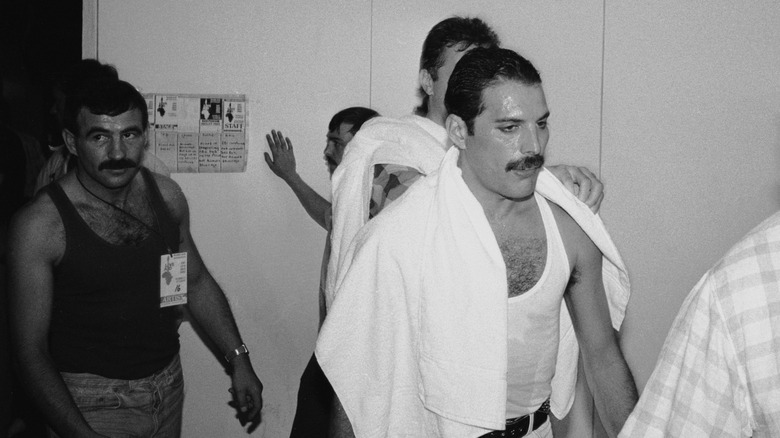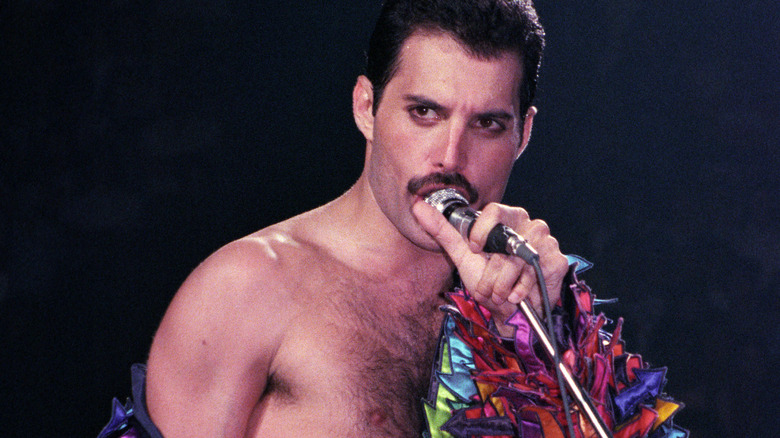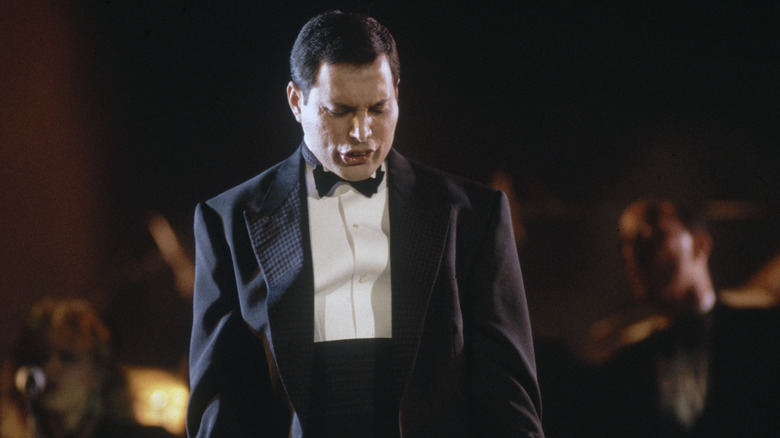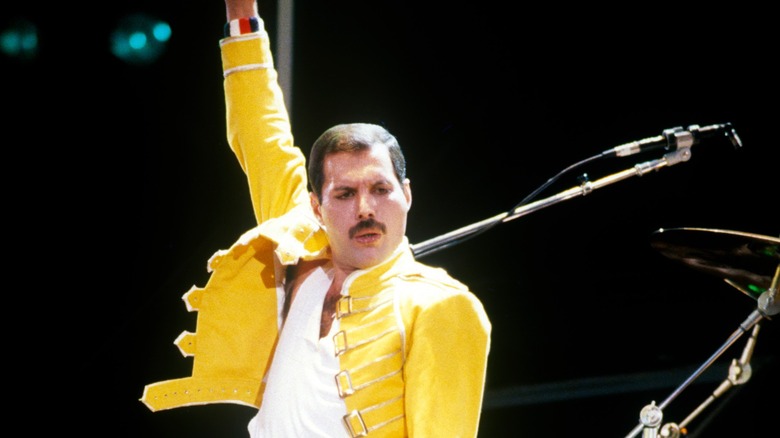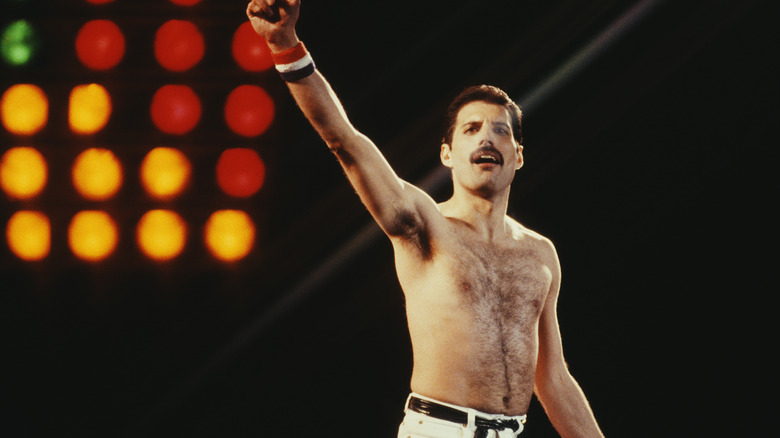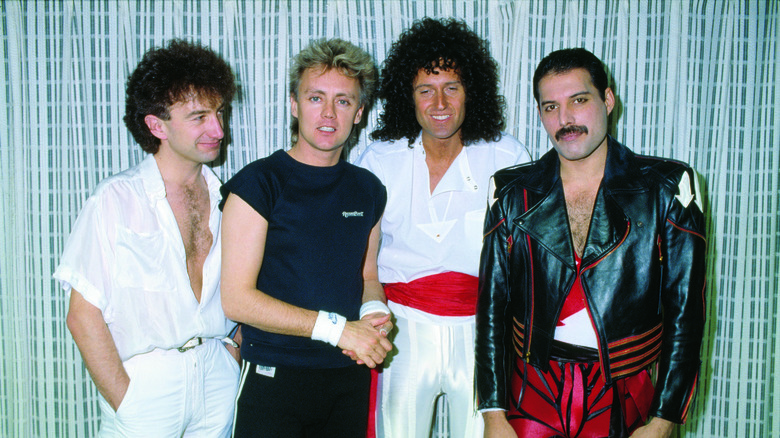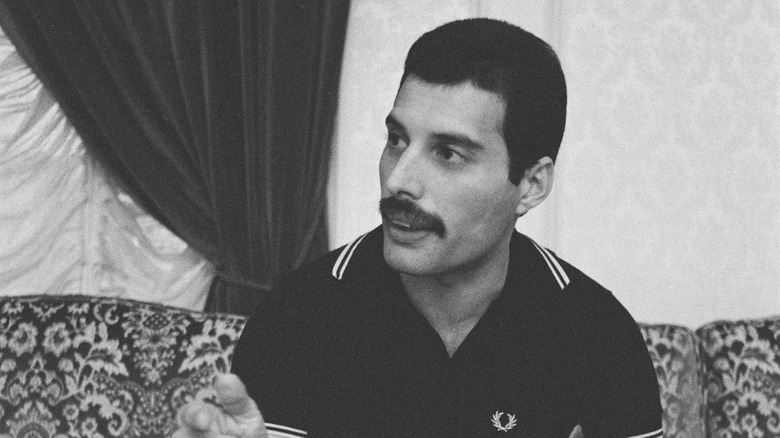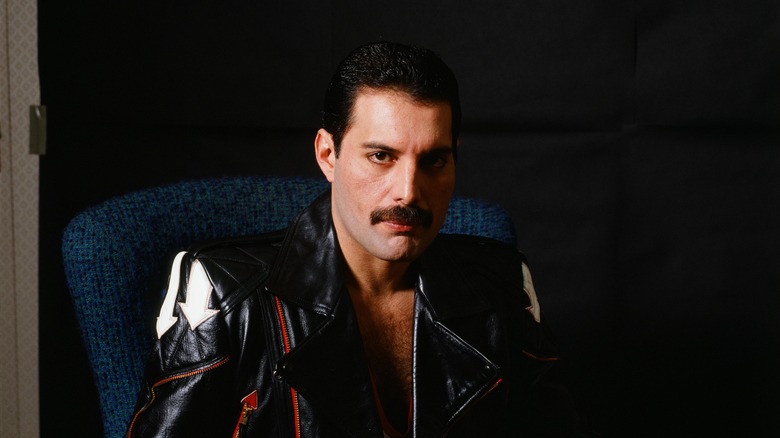10 Saddest Things About Freddie Mercury's Life
Freddie Mercury might be remembered as a confident and flamboyant performer now, but he wasn't always as outgoing as his on-stage persona would suggest. Born in Zanzibar as Farrokh Bulsara, his distinctive teeth earned him a mean nickname when the singer was sent off to boarding school in India at age eight. "We'd call him 'Bucky' for his protruding teeth, but only because we were kids who didn't know any better," one former classmate told the Hindustan Times, adding that the young Mercury kept his head down during those early years. "He was shy, but never a nobody."
The singer himself later reflected that he was deeply affected by leaving home so young. "I was a very insecure young boy," he admitted, per Express, revealing that it was a hard adjustment from his slightly pampered life in Tanzania. "Of course there were feelings of being sent away from my parents and my sister who I missed very much — feelings of loneliness, feelings of being rejected." Mercury had to learn how to stand on his own two feet in India, especially given how cruel the other boys could be. "All the things they say about boarding schools are more or less true, about the bullying..." he reflected. "One thing board school teaches you is how to be independent and not rely on anyone else."
Keep reading to find out what else the singer had to overcome during his short but spectacular life.
His family had to to flee Zanzibar
The whole Bulsara family had to leave their homeland when Freddie Mercury was still a teenager to escape the violent uprisings against the Sultan of Zanzibar in 1964. Due to their Indian and Persian heritage, they were at risk of being targeted like thousands of other Arabs and Indians in Zanzibar, which was formerly a British colony and had then been ruled over by a majority Arab government. The New York Times estimated at the time that the number of casualties was between 2,000 and 4,000 by the time the rebellions were over.
Although he stayed in the UK and never went back to his childhood home, the first-ever Freddie Mercury museum was opened up in modern-day Tanzania to honor their local hero in 2019. The founders created the museum in the hopes of reminding people where Mercury really came from, although they had to avoid certain aspects of his life due to Tanzania's laws against homosexuality. "We haven't put much attention to his personal life because that's a controversial topic for Zanzibaris," one of the museum's founders admitted to CNN, explaining that he is remembered as a great musician and artist instead. "It's the biggest tribute that we, as Zanzibaris, can do for him."
His solo career flopped
A week before Queen's first-ever album was released in 1973, Freddie Mercury launched his own solo project, as noted in the memoir, "Freddie Mercury: An Intimate Biography." Recorded in his downtime between sessions at London's Trident Studios by a house engineer, the release featured two covers: "I Can Hear Music" by The Ronettes, which had recently been reinvented by The Beach Boys, and "Goin' Back," which had previously been a hit for Dusty Springfield. In order to avoid any clash between this record and Queen's album, the singer went under the cartoonish stage name "Larry Lurex," which was a sly reference to another musician. "My own personal piss-take on Gary Glitter," Mercury admitted.
Gary Glitter was a popular glam rock performer at the time, even if he's now best known in Britain for being a convicted sex offender who served eight years in prison for sexually abusing underage girls. Despite his later fall from grace, Glitter had a lot of fans in 1973 and they weren't amused by Mercury's dig at their idol. According to "Freddie Mercury: The Biography," Glitter's fans boycotted the single and DJs refused to play it on the radio. Mercury later commented that he didn't understand the outcry. "I thought it was great!" he insisted, adding that any singer should be honored by a tribute like that. "It's a form of flattery and it was only meant in fun. Anyway, what does it matter? After Elvis Presley, it's all parody, isn't it?"
If you or anyone you know has been a victim of sexual assault, help is available. Visit the Rape, Abuse & Incest National Network website or contact RAINN's National Helpline at 1-800-656-HOPE (4673).
He kept his relationships with men a secret
Although Freddie Mercury was known for his flamboyant personality and would hint at his sexuality in interviews, he ultimately had to keep his relationships with men secret due to widespread homophobia in Britain. Even his fellow band members only realized that Mercury wasn't straight when they started noticing male groupies leaving his hotel room, as Brian May told The Times. He didn't have a conversation with them about the subject until later when the singer casually asked: "I suppose you realize I've changed in my private life?"
His most significant relationship with a man came toward the end of his life. As Irish hairdresser Jim Hutton later wrote in his book "Mercury and Me," they first met in London's gay nightclub scene in the mid-80s when Hutton was with someone else and didn't recognize Mercury as a famous singer. They later lived together and Mercury referred to Hutton as his husband, but the pair were never able to be a couple in the public eye. As Hutton wrote, the singer had to be coy in interviews but would secretly refer to his partner when he made public statements like: "For the first time I've found a contentment within myself."
Mercury only directly spoke about Hutton in one interview. "Piaf did it. So did Streisand. Now I have a hairdresser husband, dear!" he told a German reporter, according to "Freddie Mercury: An Intimate Biography."
He contracted HIV in America
Although the world only found out about Freddie Mercury's HIV in 1991, his biographers Matt Richards and Mark Langthorne later reported that he first started showing symptoms as early as 1982. The singer reportedly had a secret medical appointment in New York before performing on "Saturday Night Live" to check on a white lesion that had appeared on his tongue. Under American law at the time, he wouldn't have been able to fly into the US if he had tested positive for HIV beforehand, which might have delayed his journey toward getting medical help for these early indicators of the virus.
His partner Jim Hutton also later tested positive for HIV, as he recalled in his memoir, "Mercury and Me," although Hutton had been reluctant to undergo the test for a while and delayed it out of fear. "If I could do it all again there would be changes. Freddie and I never discussed Aids, HIV, or anything related to this terrifying illness," he reflected, adding that they should have been using condoms the whole time but never considered it. The pair also never spoke about their sexual history or the partners they had been with before they got together. "There seemed little point," Hutton added. "Today, everyone should know that the disease is sexually transmitted."
He had to hide his illness
When Freddie Mercury was first infected with HIV, the highly stigmatized virus was a medical mystery and patients faced vicious discrimination from the general public. So he avoided telling people about his diagnosis, outside of his closest friends. "AIDS was never a topic. We never discussed it," director Rudi Dolezal told People, recalling the singer's last on-screen appearance: the music video for "These Are the Days of Our Lives," which finished with Mercury looking at the camera and whispering to his fans, "I still love you."
"Freddie wanted his life to be as normal as possible," his bandmate Brian May later commented in an interview with The Telegraph. Mercury was even reluctant to tell the rest of Queen at first: as May revealed to The Times, they already knew what was going on by the time he revealed his condition to them. "I suppose you realize that I'm dealing with this illness," he reportedly began, unwillingly broaching the topic for the firtst time. "You probably gather that I'm dealing with this thing and I don't want to talk about it and I don't want our lives to change, but that's the situation." The other members of Queen let him gloss over the subject but later started organizing their recording sessions around Mercury and his need for privacy.
He narrowly missed out on a life-saving treatment
Freddie Mercury kept his AIDS hidden from the public for many reasons, but one factor of his tragic diagnosis was that it was essentially considered a death sentence at the time. When it first became headline news in the early 80s, the disease was initially called GRID, or gay-related immunodeficiency, due to the fact that it initially appeared to mostly target homosexual men. Activists had to fight for governments to even acknowledge the crisis, which meant that medical research progressed very slowly at first.
Brian May later insisted that Mercury narrowly missed out on the combination of drugs that would have saved his life. "He missed by just a few months," May told The Telegraph, reflecting on how unfair the timing of Mercury's early death had been. "If it had been a bit later he would still have been with us, I'm sure," he insisted, before adding that it was probably pointless and harmful to think about the situation like that. "You can't do 'what if' can you? You can't go there because therein lies madness." The life-saving cocktail of drugs was developed in the 90s. Highly active antiretroviral therapy (HAART) required a patient to take three medications a day but the results were fast: according to the CDC, mortality rates fell by 47 percent after it was widely introduced.
He lost his foot and his vision
Although Freddie Mercury tried to hide his illness from the public, he couldn't disguise how much his body had physically declined over the years. As Brian May wrote, per The Times, one of the major pressing issues by late 1991 "was actually his foot, and tragically there was very little left of it." Mercury reportedly shocked his bandmates by revealing it to them during dinner. He immediately apologized, telling the guitarist: "Oh Brian, I'm sorry I've upset you by showing you that." May replied by insisting that he wasn't upset for his own sake, but by the realization of "all this terrible pain" that Mercury's body was going through.
Elton John also reflected on Mercury's declining health during those final months in his memoir, "Me: Elton John Official Autobiography," revealing that the singer's vision was almost gone by the end. "He was too frail to get out of bed, he was losing his sight, his body was covered in Kaposi's sarcoma lesions, and yet he was still definitely Freddie, gossiping away, completely outrageous," John commented, adding that Mercury never let his health stand in his way. "I couldn't work out whether he didn't realize how close to death he was or if he knew perfectly well but was determined not to let what was happening to him stop him being himself."
He died before finishing his final song
In 1991, the last year of Freddie Mercury's life, the singer had his final recording sessions by Lake Geneva in Switzerland. In a tiny studio owned by Queen, Mercury took shots of vodka to steel himself before delivering improbably powerful vocals on their final tracks as a complete band. "We all knew there wasn't much time left," Brian May later reflected in an interview with The Telegraph, adding that Mercury found comfort in their Swiss studio and the quiet town of Montreux. "He obviously was in a lot of pain and discomfort. For him, the studio was an oasis."
Mercury loved the process of recording music and wanted everyone to carry on like normal, even if his strength was fading. "Certainly those days towards the end were fabulous, full of laughter and joy, Freddie as wicked as ever," May told The Times, adding that the singer never allowed anyone to coddle him. Their final song was a ballad called "Mother Love," which May wrote in the studio in between takes. "We didn't quite get to the end," the guitarist recalled, describing how Mercury had to physically brace himself while recording the first two verses. "I gave him the last verse and he said, 'Oh darling, I'm not feeling too good now, so I'll come back to it' ... And he never did." In the completed version of "Mother Love," May sang the last verse himself.
He was harassed by the press
The British press had been relentless in speculating about Freddie Mercury's health since a Harley Street clinic told a tabloid called the News of The World that his blood had been tested for HIV, as biographer David Bret noted in "Freddie Mercury: An Intimate Biography." In his final days, he finally made a public statement about having AIDS. "Following enormous conjecture in the press, I wish to confirm that I have been tested HIV-positive and have AIDS," Mercury announced, per the Los Angeles Times, adding that he had previously kept it a secret "in order to protect the privacy of those around me." He also urged everyone to join him to fight "[the] terrible disease."
He died about 24 hours after making this monumental statement. After his death, newspaper columns called the globally beloved singer a pervert and spoke about the illness as a reflection of his morality, using it as an excuse to condemn HIV positive people for their lifestyles. "There were headlines like, 'I'd shoot my son if he had AIDS,' and ones where they'd catch you unawares and you'd read it and think: 'How did this manage to make it into print?'" Mercury documentary filmmaker, James Rogan, later told Pink News, reflecting on the appalling media storm around Mercury's HIV.
His final resting place is a mystery
Freddie Mercury died of bronchial pneumonia caused by his AIDS on November, 24, 1991, at his Kensington home. Although he knew that he was dying, the singer chose to spend his last days thinking ahead to Christmas and leaving thoughtful presents for his loved ones to discover. As his friend Elton John later wrote in a book about AIDS, "Love is the Cure," he was shaken out of his grief on Christmas morning that year by the arrival of a package. "I opened it up, and inside was a painting by one of my favorite artists, the British painter Henry Scott Tuke," the singer recalled, adding that there was a sweet note referencing their drag queen nicknames for each other. "Dear Sharon, I thought you'd like this. Love, Melina. Happy Christmas," it read.
And that's not the only way Mercury planned ahead for his death. The last resting place of his ashes is still unknown since he entrusted it to his ex-girlfriend Mary Austin. "Fans can be deeply obsessive. He wanted it to remain a secret and it will remain so," she told the Daily Mail in 2013, recalling how she had to sneak out of Mercury's house to fulfill his last wishes without anyone, even his parents, finding out the location. Austin even pretended that she had a facial appointment in order to escape without his staff noticing and spreading gossip. "Nobody will ever know where he is buried because that was his wish," she insisted.

